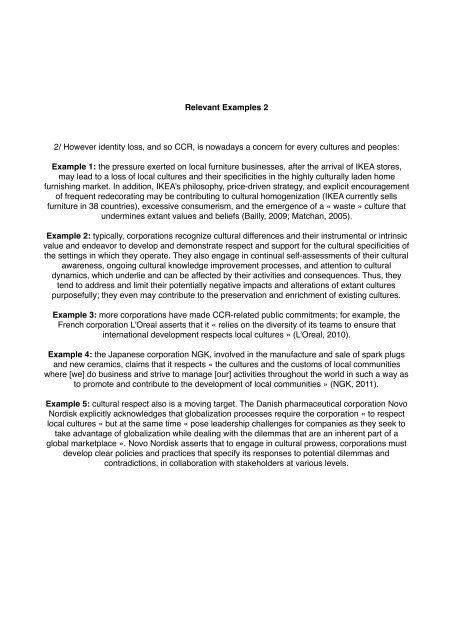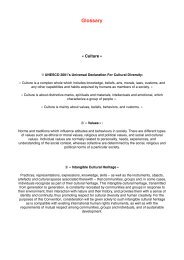Awareness Trainings - Draft #1
Create successful ePaper yourself
Turn your PDF publications into a flip-book with our unique Google optimized e-Paper software.
Relevant Examples 2<br />
2/ However identity loss, and so CCR, is nowadays a concern for every cultures and peoples:<br />
Example 1: the pressure exerted on local furniture businesses, after the arrival of IKEA stores,<br />
may lead to a loss of local cultures and their specificities in the highly culturally laden home<br />
furnishing market. In addition, IKEA’s philosophy, price-driven strategy, and explicit encouragement<br />
of frequent redecorating may be contributing to cultural homogenization (IKEA currently sells<br />
furniture in 38 countries), excessive consumerism, and the emergence of a « waste » culture that<br />
undermines extant values and beliefs (Bailly, 2009; Matchan, 2005).<br />
Example 2: typically, corporations recognize cultural differences and their instrumental or intrinsic<br />
value and endeavor to develop and demonstrate respect and support for the cultural specificities of<br />
the settings in which they operate. They also engage in continual self-assessments of their cultural<br />
awareness, ongoing cultural knowledge improvement processes, and attention to cultural<br />
dynamics, which underlie and can be affected by their activities and consequences. Thus, they<br />
tend to address and limit their potentially negative impacts and alterations of extant cultures<br />
purposefully; they even may contribute to the preservation and enrichment of existing cultures.<br />
Example 3: more corporations have made CCR-related public commitments; for example, the<br />
French corporation L’Oreal asserts that it « relies on the diversity of its teams to ensure that<br />
international development respects local cultures » (L’Oreal, 2010).<br />
Example 4: the Japanese corporation NGK, involved in the manufacture and sale of spark plugs<br />
and new ceramics, claims that it respects « the cultures and the customs of local communities<br />
where [we] do business and strive to manage [our] activities throughout the world in such a way as<br />
to promote and contribute to the development of local communities » (NGK, 2011).<br />
Example 5: cultural respect also is a moving target. The Danish pharmaceutical corporation Novo<br />
Nordisk explicitly acknowledges that globalization processes require the corporation « to respect<br />
local cultures » but at the same time « pose leadership challenges for companies as they seek to<br />
take advantage of globalization while dealing with the dilemmas that are an inherent part of a<br />
global marketplace ». Novo Nordisk asserts that to engage in cultural prowess, corporations must<br />
develop clear policies and practices that specify its responses to potential dilemmas and<br />
contradictions, in collaboration with stakeholders at various levels.




